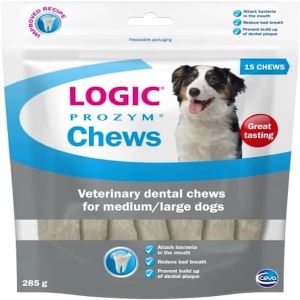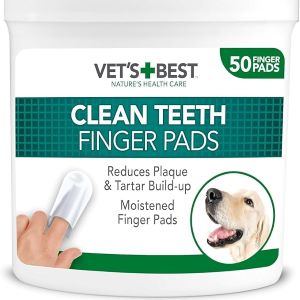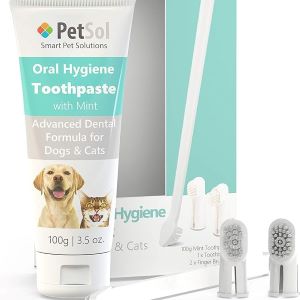Have you ever wondered why your dog is the ultimate chew champion? How many dental chews can a dog have a day?
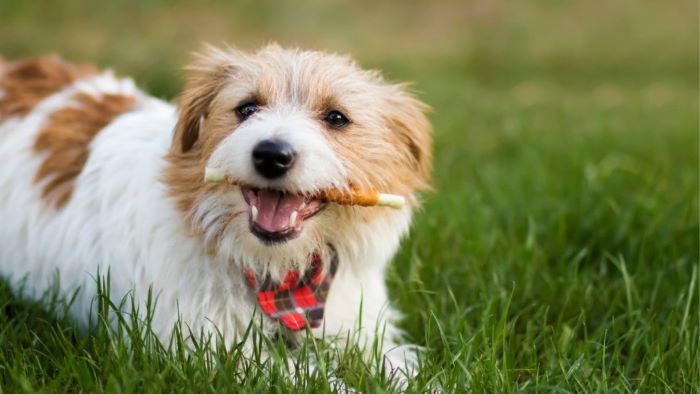
And why do your furry friends go all out on chewing adventures, like they’re preparing for the chewing Olympics? Let’s dive into their world and solve this adorable chewing puzzle.
You Might Also Like:
How Many Dental Chews Can a Dog Have a Day?
“Dental chews are crucial for keeping your dog’s teeth and gums healthy. Chewing on them helps remove plaque and tartar buildup, which can lead to bad breath and dental problems🦷“, confirms the expert at WebMD.
On average, the dog can have one dental chew🦴 in a day along with their meal. They act like a toothbrush🪥, scrubbing away debris. However, it’s important to give the right amount. One chew a day is usually good but follow the packaging instructions.
Overdoing it might upset your pup’s tummy. Remember, dental chews are a tasty way to care for your furry friend’s smile, but moderation is key for their overall well-being.🐶
Influencing Factors
The quantity of dental chews for dogs is influenced by several factors, including the size and breed of the dog, chewing behaviour, and more.
- Size of the dog: This is an important factor in choosing the quantity of dental chews. Smaller dogs require smaller chews, while larger dogs require larger chews.🦴
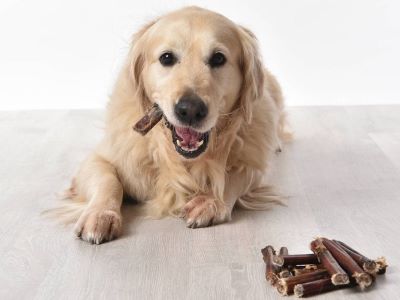
- The breed of the dog: Breed plays a role in deciding the quantity of dental chews. For example, breeds with smaller mouths may require smaller chews than breeds with larger mouths.👄
- Chewing behaviour: This behaviour plays a role in determining the number of dental chews. Some dogs are aggressive chewers and may require more chews than dogs that are not as aggressive.
- The nutritional content: The dental chew can also influence the quantity of chews a dog consumes. Some dental chews are high in calories and may need to be limited to prevent weight gain. 🥩
Additionally, some dogs may prefer certain types of chews over others, which can affect the quantity of chews they consume and some dental chews contain ingredients that can cause digestive upset in some dogs, which can also affect the quantity of chews they consume.🦴
General Guidelines for Dental Chew Intake
Here are a few guidelines on a dog’s dental chew intake:
| Dog Size🐶 | Recommended Daily Dental Chews⏳ |
|---|---|
| Small (<10 lbs) | 1-2 dental chews per day |
| Medium (10-50 lbs) | 2-3 dental chews per day |
| Large (>50 lbs) | 3-4 dental chews per day |
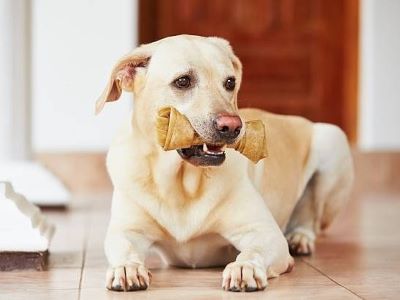
When choosing the best dog chews for your pup, keep these general guidelines in mind based on their size. Keep in mind that these recommendations can vary based on factors such as age, breed, and overall health. Monitor your dog’s chewing habits and consult a veterinarian if you observe excessive chewing or digestive issues.
Vet’s Suggestions
Here are some breed-specific considerations by experts🥼:
- Toy breeds such as Chihuahuas, Pomeranians, and Yorkshire Terriers are more prone to dental issues than larger breeds. They have smaller mouths and teeth that are more crowded, which makes it easier for bacteria to accumulate and cause problems.🐩
- Brachycephalic breeds such as Pugs, Bulldogs, and Boxers have a higher risk of dental disease due to their short snouts. They often have misaligned teeth and crowded mouths, which can lead to tartar buildup and gum disease.
- Greyhounds are known for having weak enamel, which makes them more susceptible to tooth decay and cavities.
- Dachshunds have a unique jaw structure that can make them more prone to dental issues. Their long, narrow jaws can cause their teeth to become crowded and misaligned, which can lead to tartar buildup and gum disease.
- Golden Retrievers are prone to developing periodontal disease. This is due to their genetics, as well as their love of chewing on things. They also tend to have a lot of extra skin around their mouths, which can trap food particles and bacteria.
It’s important to note that these are just a few examples of breed-specific dental health considerations. Every dog is unique, so it’s always best to consult with a vet for personalized guidance on how to keep your dog’s teeth healthy.
Alternatives to Dental Chews
Incorporating dental-friendly diets and maintaining regular oral hygiene practices are essential for your dog’s overall dental health. Here are some of the alternatives:
- Dental-Friendly Diets: Opting for foods that support dental health can significantly contribute to your dog’s oral well-being. Look for specially formulated diets or treats that promote dental hygiene. These diets often have textures that help scrub away plaque and tartar as your dog chews, aiding in preventing dental issues.🪥

- Regular Brushing: Just like humans, dogs benefit from regular teeth brushing. Use a dog-specific toothbrush and toothpaste to clean your dog’s teeth. Start with gentle introductions and gradually increase the time spent on brushing. Aim for at least a few times a week, if not daily, to effectively remove debris and maintain oral health.
- Oral Hygiene Practices: Alongside dental chews, focus on fostering good oral hygiene habits. Encourage safe chewing behaviours with appropriate toys that can help clean teeth and massage gums. Regularly check your dog’s mouth for signs of dental problems like bad breath, swollen gums, or discoloured teeth🦷. Early detection can prevent more severe issues down the line.
- Professional Dental Care: Schedule regular veterinary check-ups, including dental exams, to catch any developing oral health problems. Professional cleanings might be recommended to remove stubborn tartar buildup, especially in hard-to-reach areas.
- Consultation with the Vet: Every dog is unique, and their dental needs can vary. Consult with your veterinarian to create a personalized dental care plan tailored to your dog’s age, breed, and specific dental requirements.🥼
Incorporating dental-friendly diets and establishing a routine of regular brushing and oral hygiene practices complement the benefits of dental chews, leading to a happier and healthier smile for your furry companion.
Dental chews like rawhide and enzymatic chews usually last about 1-2 days. For longer-lasting natural chews, many dog owners turn to yak chews. How long do yak chews last? On average, 1-2 weeks for small dogs, 1-2 months for medium dogs, and 2-3 months for large breeds. Always monitor the chew’s size and replace when needed.
FAQs
How Many Dental Chews Should I Give to My Dog?
It’s important to only give a dental chew once a day.” Keep these tips in mind when giving your dog a dental chew, this can be used as a training option so asking your pup for good behaviour or rewarding them for it is encouraged prior to giving the treat.
Is It Okay to Give Dogs Treats Every Day?
There’s no rule about how often you can dole them out, as long as you limit treats to 10% of their daily calories. Some owners choose to give one large biscuit each day. Others give a handful of kibble (perhaps 20 or 30 pieces) over the course of the day, one or two pieces at a time. Giving no treats is fine, too.
Can a Puppy Eat Dental Chews?
Puppy teeth are baby teeth: While they’re certainly sharp, your puppy’s teeth are not fully developed. Wait until their adult teeth come in and their jaw structure has had a chance to develop before giving them dental treats; otherwise, they may damage their little chompers.
What Food Is Good for Dog Tooth Cleaning?
Raw Animal Bones. Raw bones are great for removing bacteria and debris around the teeth thanks to their flexibility and texture. Fruits and Vegetables. Moulded Dental Chews. Yogurt or Kefir. Dental Care Specific Dry Dog Food.
Are Dental Chews Effective?
Experts told us dental treats can effectively reduce plaque and tartar buildup on your dog’s teeth, these are the ones they recommend. Just like humans, dogs can suffer from a variety of dental problems, ranging from periodontal and gum disease to tooth decay.
Conclusion
In the quest for a happy and healthy dog.🐶, striking the perfect balance between dental chew benefits and appropriate quantities is key.
While dental chews work wonders in maintaining your dog’s oral hygiene, it’s crucial to remember that moderation is the name of the game. Just like we wouldn’t binge on treats, neither should our dogs.
By aligning the suggested daily quantities with your dog’s size and considering individual factors, you’re actively prioritizing their overall oral health.🦷
So, as you delight in watching your furry friend enthusiastically chew away on their dental treats, keep in mind the bigger picture – a vibrant smile, fresh breath💨, and a joyful companion.
And now, the question you might be wondering: How many dental chews can a dog have a day? Well, the answer lies in understanding your dog’s size, following the advice💡, and always staying attentive to its unique needs.
So, dear pet parents happy chewing and healthier smiles await!🐾
As you search for the perfect dental chews for your pup, you may come across options like Greenies, CET chews, and the uniquely named Paddywack. But what is Paddywack and what makes it stand out?
